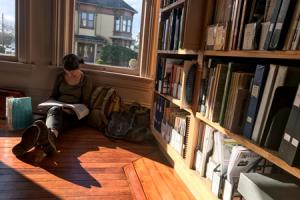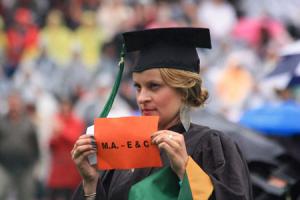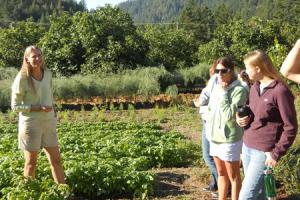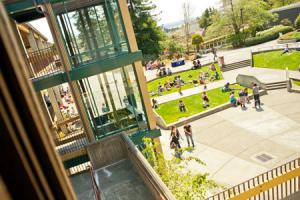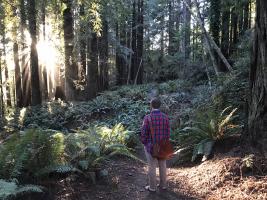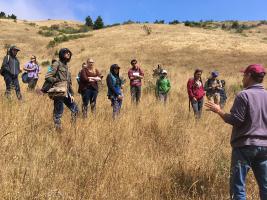Spring 2018
- February 1
Maia Wikaira, Current US Fulbright Fellow and Legal Fellow for the Yurok Tribe
"Legal personality in rivers, national parks and mountains: the role of indigenous knowledge in transforming environmental law in New Zealand"Maia Wikaira descends from the indigenous Maori tribes of Ngati Tuwharetoa, Ngapuhi and Te Rarawa. Prior to coming to the US, she was an attorney with Kahui Legal, the Maori firm that worked on New Zealand's Whanganui River settlement, which afforded legal personality to the river. Wikaira is currently working as a Legal Fellow in the Office of Tribal Attorney of the Yurok Tribe. She is in the US as a Fulbright Fellow, and recently completed her Masters in Environmental Law and Policy at Stanford Law School.
- February 8
Frederica Bowcutt, Professor of Botany at Evergreen State University
"The Tanoak Tree: An Environmental History of a Pacific Coast Hardwood"Radically different perceptions of the tanoak tree (Notholithocarpus densiflorus) have ranged from treasured food plant to cash crop to trash tree. Having studied the patterns of tanoak use and abuse for nearly twenty years, Frederica Bowcutt uncovers a complex history of cultural, sociopolitical, and economic factors affecting the tree's fate and discusses hopeful changes, including reintroduction of low-intensity burning to reduce conifer competition for tanoaks, emerging disease resistance in some trees, and new partnerships among tanoak defenders, including botanists, foresters, Native Americans, and plant pathologists. Bowcutt teaches botany in interdisciplinary programs at The Evergreen State College in Olympia, Washington. She specializes in floristics, field plant ecology, and plant-centric environmental history.
- February 15
M Jackson, 2017 National Geographic Society Emerging Explorer
"The Secret Lives of Icelandic Glaciers"Geographer, adventurer, environmental educator, and 2017 National Geographic Society Emerging Explorer M Jackson studies and writes about glaciers and climate change. She earned a doctorate from the University of Oregon in geography and glaciology, where she examined how climate change transformed people and ice communities in Iceland. A veteran three time U.S. Fulbright Scholar in both Turkey and Iceland, M Jackson currently serves as a U.S. Fulbright Ambassador, an Arctic Expert for the National Geographic Society, and international advisor for the Circumpolar Observatory. Jackson holds a Master's of Science degree from the University of Montana, and served as a Peace Corps Volunteer in Zambia. She is the author of While Glaciers Slept: Being Human in a Time of Climate Change (2015) and The Secret Lives of Icelandic Glaciers (2018), and is currently working on In Tangible Ice, a multi-year project examining the socio-physical dimensions of glacier retreat in near-glacier communities within all eight circumpolar nations.
- March 1
Joseph Rand, Research Affiliate, Electricity Markets & Policy Group at Lawrence Berkeley National Lab
"Do wind turbines make good neighbors? Results from a nationwide survey"Wind power now supplies over 6% of the nation's electricity demand from over 60,000 turbines installed across the country, and experts predict substantial deployment in the years ahead. Achieving this continued deployment will require coordination and cooperation with the communities in which wind power projects are proposed to be located. Despite broad public support for wind power in general, vocal opposition to proposed wind projects from hosting communities has emerged as a significant barrier to deployment, resulting in significant delays and even abandoned projects. This presentation will share results from the first nationally representative survey (n = 1705) of individuals living in close proximity to U.S. wind farms. The research examines not only the attitudes of support and opposition of wind neighbors, but also the factors influencing those attitudes, such as proximity to turbines, perceived fairness of the planning process, beliefs about climate change, place attachment and community identity, view and sound impacts, financial compensation, and more.
Joseph Rand conducts research and analysis on renewable energy, including cost and market analysis, spatial data analysis, and research related to public acceptance and deployment barriers of renewable energy. He holds a MS in Energy and Resources from the University of California, Berkeley and a BA in Environmental Studies from Macalester College.
- March 22
Emily Burns, Director of Science for Save the Redwoods League
"Restoring Redwood Forests in a Changing Climate"The importance of coast redwood forests is increasing in this rapidly changing climate. The old-growth redwood forests of the north coast store world-record breaking amounts of carbon and the redwoods themselves are growing faster today than in previous decades. Unfortunately, little old-growth redwood forest remains after more than a century of timber harvest, but research shows that restoration techniques are effective at accelerating the growth of harvested forests and increasing their carbon sequestration potential.
Emily Burns serves on Save the Redwoods League’s executive leadership team and directs the Research Program that includes the Redwoods and Climate Change Initiative and the Redwood Genome Project. In addition, she directs the League’s Restoration, Stewardship, and Conservation Planning Programs to be grounded in science and practical to help forest managers. Burns holds a PhD in Integrative Biology on the impacts of fog on coast redwood forest flora from the University of California, Berkeley and a BS in Plant Biology from the University of California, Davis. She is a Research Associate in the Ecology and Evolutionary Biology Department at the University of California, Santa Cruz, and she is the recipient of the 2013 Women in Science Frameshifter Award from St. Catherine University. Burns contributes frequently to the League’s blog, and in her scant spare time, she enjoys embroidering, particularly designs of native plants of redwood forests.
- April 5
Jana Ganion, Sustainability Director of the Blue Lake Rancheria, and Peter Lehman, Founding Director of the Schatz Center
"Greening the Grid and Improving Resilience: The Blue Lake Rancheria Microgrid" - April 12
Nicholas Lam, Research Scientist at the Schatz Center
"Increasing energy access to benefit health and the environment" - April 19
Dominic Corva, Founder and Executive Director of the Center for the Study of Cannabis and Social Policy
"Rethinking the Nature of Cannabis and Social Policy in the Context of Post-Prohibition" - April 26
Frank Kanawha Lake, Research Ecologist for the USDA Forest Service's Pacific Southwest Research Station, Fire and Fuels Program
"Learning from Traditional Knowledge to Guide the Future of Sustainable Forestry Management"

